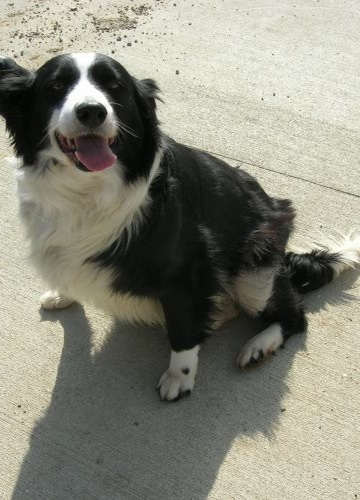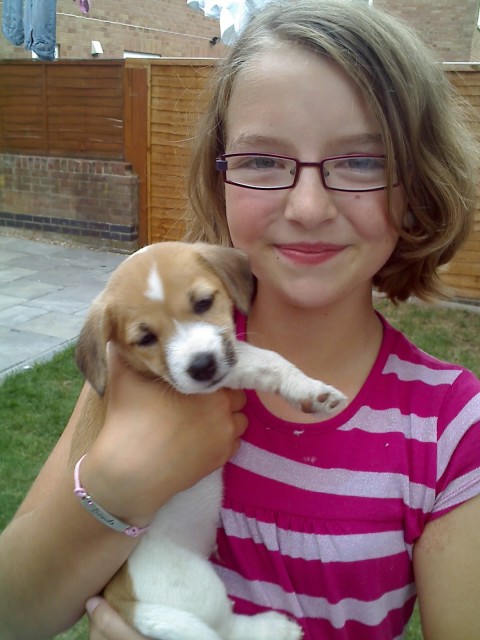Question
---The litter box is as big as the one he was going in with his parents and siblings. It is in the dining room with his blankets and taxi and food but it is far enough away to where he doesn't have to be right next to it all the time. we have newspaper in the litter box right now because they said he was to young to understand that the litter isn't food yet. He miss everytime and he goes anywhere he wants it is not in a certain place. when we catch him we put him in his litter box. and no he is not neutered yet. should we get him neutered we were still thinking about the possiblity of breeding.----------------------------------------
The text above is a follow-up to ...
-----Question-----
My 6 month yorkie is about 2.4lbs and when we got him at about 4 months he was crate trained and we have a puppy litter box for him and he only missed once in awhile. Now he is missing all the time and I don't know what has happened. What should I do?
-----Answer-----
It could be several things, April. Is the litter box too small for him? Where is it? Where is he actually going to the bathroom? What kind of litter are you using in the box? When does he 'miss'? What do you do about it? Is he neutered yet?
Kristen
AnswerHello again, April. You might want to get some puppy training pads from K-mart or the pet store and use them in the litterbox rather than just paper. They are scented to attract the puppy to potty on them, so they may help with his 'missing' the box. When he DOES potty in the box, wait until he's finished doing whatever it is he's doing (peeing or pooping), and then praise him in a happy tone of voice so he knows he's done good! Play with him for a few minutes afterwards so he knows that going to the bathroom in the box makes you happy.
If you catch him starting to 'go' somewhere else in the house, make a noise to startle him (clap your hands, say 'ah ah' etc.) and immediately get him to the litterbox. At first, you may have to pick him up and carry him to it, but your goal is to get him to go to it on his own, so use a happy voice to encourage him to follow you to the litterbox rather than picking him up and carrying him all the time. If, when he gets to the box, he doesn't get in, you can pick him up and put him in it. It may take a few minutes, and you may have to keep putting him back in it over and over, but do not let him leave the litterbox until he's finished 'going.' Then lots of happy praise! Clean the areas that he's already soiled elsewhere in your house with an enzymatic cleaner such as Nature's Miracle to remove all traces of the odor, so he is not drawn back to those areas.
Something else you could try is keeping him on a 6 foot leash attached to you, so that he cannot sneak off to potty out of sight. Doing this will also allow you to learn his specific signs that he is needing to go, and will help when he's loose because you'll know what to look for and be able to get him to the box before he starts 'going' on the floor.
And, it goes without saying that you should keep him in his crate when you are not able to watch him, but he should not be left in his crate for extended periods of time. A general rule with puppies is that they should be able to 'hold it' for as many hours as they are old in months. At 6 months old, that means he *should* be able to stay in his crate for up to 6 hours without soiling it, as long as you do not give him access to food/water an hour before putting him in it, and that you make sure he pees and poops before you put him in there. Some dogs can hold it for longer, and some less. My now 7 month old German shepherd could (and would! even if I took her out several times) go all day (8-9 hours) when she was just 5 months old. My now 19 month old German shepherd, on the other hand, had a hard time holding it all day until he was over a year old. Each dog is different, but the general rule is a starting point.
Personally, I would have him neutered, unless you plan on showing him. Participating in dog shows with him will determine whether or not he should be bred; if he does not place well in shows, then he is not a best example of the breed, and he should not be bred. A dog that is not an excellent example of their breed should never be bred, because there are far too many dogs being euthanized every day for lack of enough homes - and that includes purebreds! Why breed a dog that is substandard? On top of showing, if he does well in shows and you decide to breed him, you must do all the necessary health testing on both him and the female he is to breed with, to make sure neither of them are carriers of any genetic health problems that run in the breed. Here's a list of some of these problems:
http://www.healthypet.com/library_view.aspx?ID=161&sid=1
If you aren't interested in, or have the time/money to show him and have him and any bitch you plan to breed him with health tested, go ahead and have him neutered now, before the testosterone starts to kick in and he begins lifting his leg and marking all over your house. Neutering can prevent prostate cancer, completely eliminate the chances of testicular cancer, and result in a less stressed dog because he won't constantly have the urge to breed.

 dog who growls and nips
Question
Ladybug
We adopted a rescue dog, Ladybu
dog who growls and nips
Question
Ladybug
We adopted a rescue dog, Ladybu
 new puppy
Question
bella
I adopted a puppy from the humane
new puppy
Question
bella
I adopted a puppy from the humane
 dog size
Question
raven
I have a 5 month old Pomeranian/C
dog size
Question
raven
I have a 5 month old Pomeranian/C
 Redish bump between dogs toes
QuestionHello I have a three year old Australian Shephe
Redish bump between dogs toes
QuestionHello I have a three year old Australian Shephe
 Puppy hates being alone.
Question
Me and Toby
Our jack russel is extremely cuddl
Puppy hates being alone.
Question
Me and Toby
Our jack russel is extremely cuddl